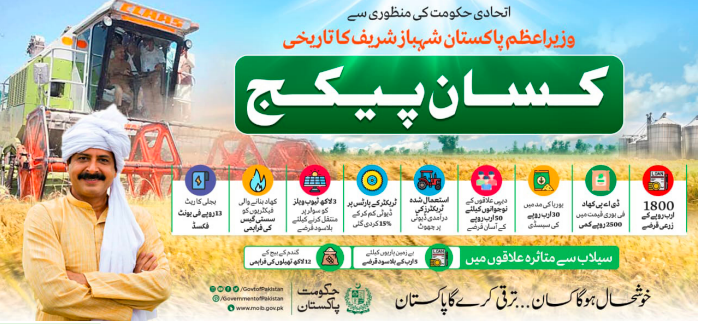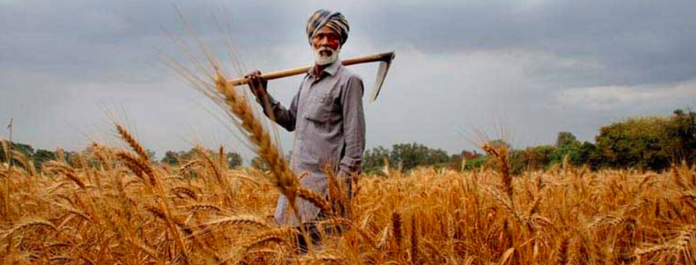The PML-N believes that the country’s progress is directly proportional to the development of Pakistan’s agricultural sector. As evident from the record after the 2015 floods, then Prime Minister Nawaz Sharif announced the Kissan Package of Rs341 billion with the targeted uplift scheme of 1.2 million farmers. During the previous government of PTI, not a single agriculture package was announced except for the rebranding of the Kissan Card Scheme with its own stamp.
Prime Minister Shehbaz Sharif on 31 October 2022 announced the Kissan Package of Rs1,800 billion ($8.1 billion) for farmers to offset widespread destruction brought on by unprecedented floods in the country.
This summer’s flooding, caused by monsoon rains nearly triple the usual ferocity, wiped out huge swaths of crops, leaving already impoverished families struggling to obtain food. Even though the government is strapped for cash and world food prices are high, Prime Minister Shehbaz Sharif announced a much-needed assistance package of Rs1800 billion for farmers to curtail the risk of serious food shortages.
Prime Minister Sharif said that it is important to resolve the issues of farmers through higher loans and subsidies to achieve targeted agricultural growth for the economic development of Pakistan. The following are the main features of the package.

The Package:
- Waiver of markup on loans to farmers in flood areas: In this package, the markup on loans to farmers belonging to flood-affected areas, has been waived off and an amount of Rs11 billion has been allocated in this regard.
- Fresh loans for small farmers: Rs8 billion has been allocated for disbursing fresh loans to small farmers in flood-affected areas.
- Loan for youngsters: Loans worth Rs50 billion will be provided to youngsters living in rural areas who are willing to become professional farmers. It is also decided that loans to youngsters would be provided on a markup less than the market rate and the government will set aside nearly Rs6.5 billion for this venture.
- Reduction in fertilizer prices: Di-ammonium Phosphate (DAP) price has been reduced from Rs14000 to Rs11250. Following a tough negotiation with the government, the fertilizer plants have agreed to slash Rs2,500 per bag on DAP. A DAP bag will now be available at Rs11,250 in the market.
- Availability of urea in sufficient quantity: To strengthen the agriculture sector of Pakistan, the government has also decided to allocate Rs30 billion as a subsidy on urea so that small farmers can get this important fertilizer at cheaper rates. In light of the requirements of Rabi season, the government allowed the import of 300,000 metric tons of urea. After tough negotiations, the Ministry of Industries & Production helped the government save $100 per ton under the government-to-government deal. Urea was available at $600 per ton initially but because of the concerted effort of the authorities, the concerned price was brought down to $500 per ton.
- Launch of solarization of agri tube well: Regarding relief on electricity prices, the government has decided to provide interest-free loans to the owners of 300,000 tube wells currently operating in Pakistan to enable them to solarize these tube wells. The farmer won’t have to pay electricity bills and will only have to pay the loan instalment while the government will pay the interest amount.
- Loan for SME sector for agriculture purposes: To promote small and medium enterprises (SMEs) in the agriculture field, Rs10 billion has been allocated for the SMEs’ modernization scheme in the agriculture sector.
- Second-hand tractors to be imported: The government has decided to import up to five-year-old second-hand tractors to help farmers who cannot afford the locally-manufactured tractors. A 50 per cent rebate on duty will be given to those importing these five-year-old second-hand tractors.
- 50 per cent rebate on duty on import of tractor parts: In order to incentivize new players and investors planning to become a part of the tractor industry, concession on the import duty of tractor parts will be provided. The duty on completely knocked down parts has been brought down to 15 per cent from 35 per cent.
- 2 million wheat seed bags for flood-affected farmers: 1.2 million bags of certified wheat seeds would be provided to farmers in flood-ravaged areas free of cost. Rs13.20 billion have been allocated for this purpose.
- Reduction of tariff on agri meters: The government has decided to take a fixed cost of Rs.13 per unit as an “immediate” relief to the farmers for which a subsidy worth Rs43 billion will be given.
- Loan portfolio for farmers enhanced: The prime minister announced interest-free loans for tenant farmers in flood-hit areas. A subsidy worth Rs5 billion has been allocated for these loans. In addition to this, the government increased the value of the Produce Index Unit (PIU) from Rs4,000 to Rs10,000 for obtaining loans for agriculture purposes.
While chairing a review meeting of the initiative in the last week of November, Prime Minister Shehbaz Sharif said that he would not tolerate any laxity in the implementation of the Kissan Package announced by the incumbent government, signalling a seriousness of his commitment towards the country’s farmers.








